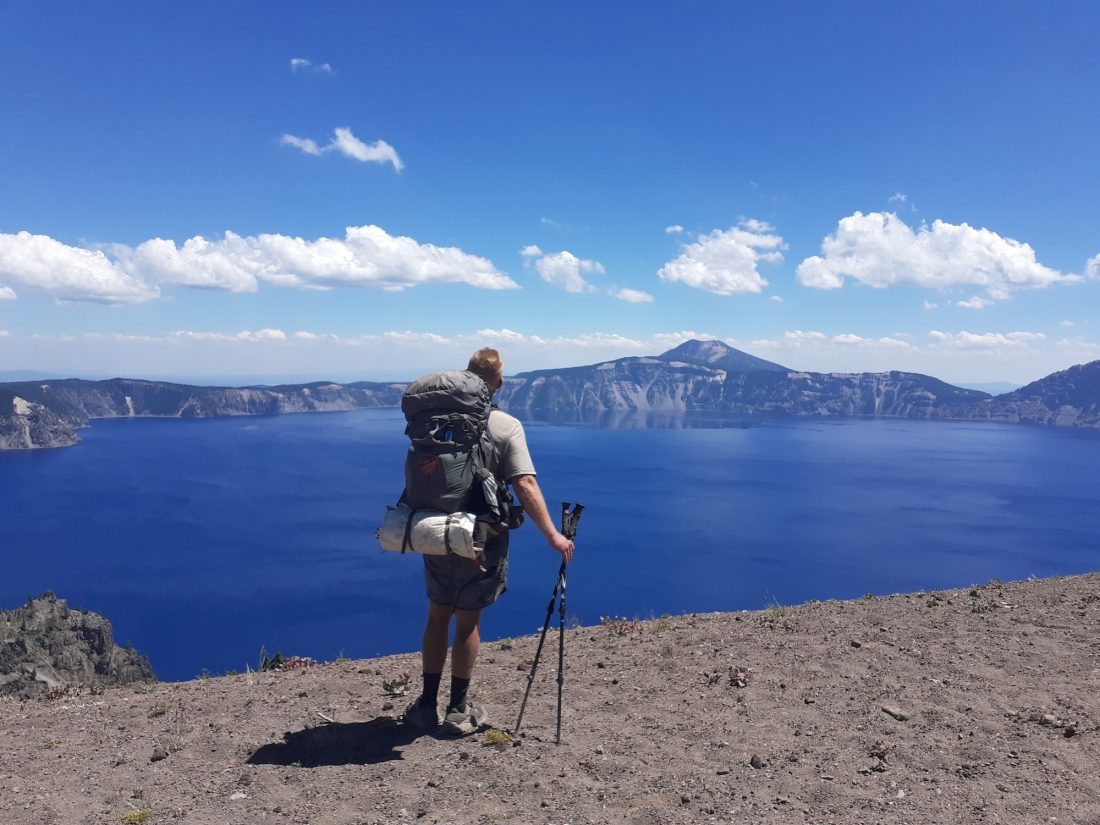Salvation Army Adult Rehabilitation Program (ARP) graduate completes the 2,650-mile hike over the course of five months, deepening his relationship with God and prayer along the way.
“I just got that idea of hiking the Pacific Crest Trail (PCT), and I couldn’t get it out of my head,” Salvation Army Adult Rehabilitation Program (ARP) graduate James Ihrig said. “It became my purpose to change my life.”
Ihrig first came across the idea in prison, where he read Cheryl Strayed’s memoir, “Wild: From Lost to Found on the Pacific Crest Trail.”
The memoir details Strayed’s decision to hike the PCT following a series of unfortunate life events, including losing her mother to cancer, a divorce from her husband, and an introduction to heroin at 26 years old. “That was a great book. And that inspired me,” Ihrig said.
From that point forward, Ihrig began to prepare himself physically and mentally for the 2,650-mile hike. For the remainder of his sentence, he jogged on the track in prison to build his strength.
Immediately following his release from prison, Ihrig entered himself into a Salvation Army ARP in Seattle, Washington to begin working on himself mentally. Like Strayed, Ihrig also found himself battling addiction and said he knew he needed help before setting out on the hike.
“I was very excited to be out of prison, off drugs and doing something, you know, significant with my life,” Ihrig said.
The Salvation Army Seattle rehabilitation programs are offered for free to those struggling with substance abuse and seeking aid in their recovery. Typically, programs run for six months—however, participants can take as long as they need to work through the 12-steps.
At The Salvation Army program, it was Ihrig’s sponsor who told him to begin praying in the morning and at night with the third-step prayer, which reads:
“God, I offer myself to Thee—to build with me and to do
with me as Thou wilt. Relieve me of the bondage of self,
that I may better do Thy will. Take away my difficulties,
that victory over them may bear witness to those I would
help of Thy Power, Thy Love, and Thy Way of life.”
Ihrig said his sponsor told him to “watch out” because he would begin to have “spiritual experiences” resulting from his prayers, which Ihrig said he felt first-hand on the trail. “My sponsor told me to pray, and pray I did!”
While working through the steps, ARP participants are also taught valuable skills needed to re-enter the workforce and continue to live drug-and-alcohol free following graduation.
Ihrig graduated from the program in November 2020, which left him about three months to prepare for his hike. When deciding to hike the PCT, travelers must take their start dates seriously, as one needs to average 10 to 20 miles a day to avoid freezing to death during the colder months.
Following graduation, Ihrig began running and adding cardio exercises to prepare, however, he said, “there was no real way I could prepare for the trail.”
To save up for the costs associated with the hike—equipment, provisions, lodging and transportation— Ihrig found a job and also ran a fundraising campaign on GoFundMe.com, where he was able to raise over $5,000 to complete the hike.
Ihrig began the hike on March 14, 2021, in Campos, California, with a friend, Matt B., whom he met through treatment and convinced to come along. Before the hike, the two Salvation Army alums even started a hiking group on Facebook titled “Sally Trailers,” to connect other alums with hiking interests.
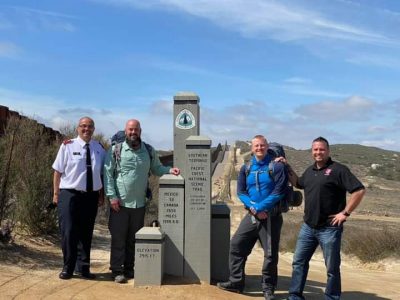
“When I first started, I really had no clue what I was doing,” Ihrig said, “I just knew that this is what I was going to do. And so I had to learn a lot of things.”
For 830 miles, Ihrig and Matt hiked together crossing through deserts, rocky mountains and even icy terrains.
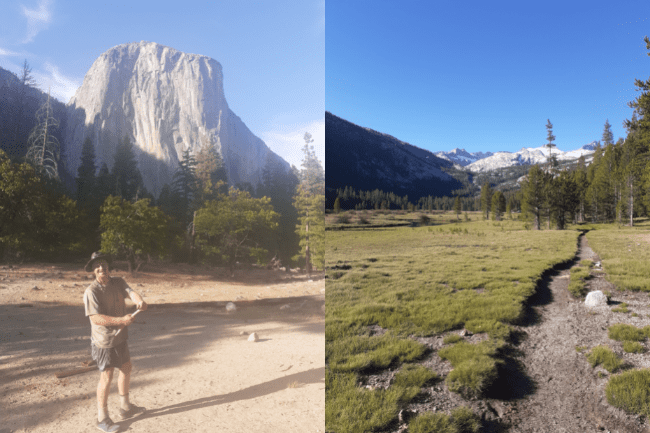
Along the way, each man was given a “trail name” by the other. “Nobody gets called by the real name out there,” Ihrig said. Quickly, Ihrig dubbed Matt, “Chuck Wagon,” due to the large quantities of food he would carry on his back.
While hiking through the ice-covered grounds of the Sierras, Ihrig said he and Matt “got into some really sketchy weather,” where the temperature dropped to five degrees for three days. Making camp on the snow-covered ground each night became a brutal ritual.
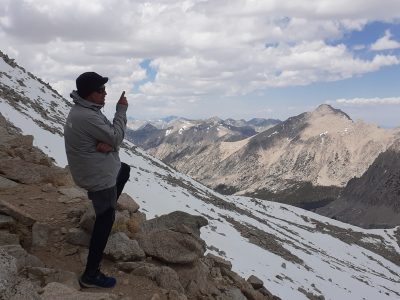
“I mean, it was dangerously cold,” Ihrig said. To combat the frigid conditions, Ihrig said he would stack rocks around the fire pit at night, where once warmed enough he would place the rocks inside his tent, “to keep me warm, keep me alive,” he said.
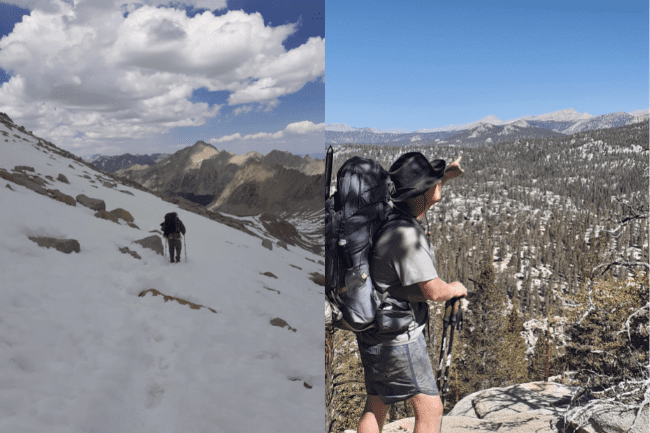
“My dad gave me that idea. He used to do that all the time when we’d go camping. I thought he was crazy…but I adopted that technique,” Ihrig said.
From that point forward, “Hot Rocks” became Ihrig’s trail name.
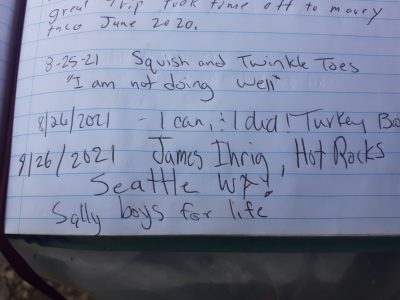
After reaching Bishop, California, Matt decided his time on the trail was over. The 300 miles that followed, Ihrig said, were the “most difficult” portion of the entire hike. After Matt left, Ihrig said he crossed paths with very few people; “it was just me and my Creator at that point.”
The time Ihrig spent alone, he said, was especially hard. “I broke down in tears every day and prayed just to help me find a way to keep going.” However, Ihrig said it was during these 300 miles where he felt himself grow spiritually and emotionally.
By the time Ihrig reached Mammoth Lakes, California, he said he was as close to quitting. He accidentally missed his exit point and set himself back 17 miles.
Feeling defeated, Ihrig said he sat at a bus stop and began thinking, “What am I doing out here? I don’t belong here. I have no friends. I’m not experienced, my backpack’s too heavy.” Yet, it was at that moment he received a text from a friend which read: “You’re not going to quit, are you?”
“As soon as I saw the text, and just like my brain switched from quitting,” Ihrig said, even labeling the text as “instrumental” for keeping him on the trail.
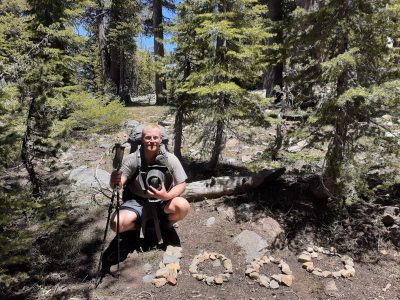
By June 6, Ihrig had made it 1000 miles—but there was still a long way to go.
As a man in recovery, Ihrig had to re-think celebrations on the trail. Rather than celebrating with alcohol or cannabis, which he said was popular among other hikers, Ihrig chose to celebrate with food. “So, when I got into town, I was having a cheeseburger or a steak if I could afford it,” Ihrig said.
When Ihrig arrived at the California-Oregon border, he said he got a “serious morale boost” and knew he was going to be able to make it the entire way.
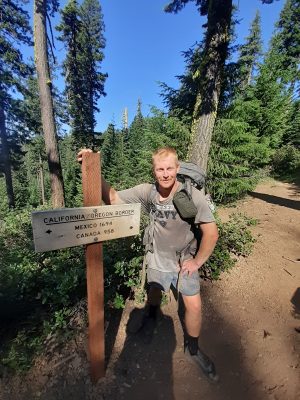
Along the way, Ihrig said he saw many breath-taking sites—one of which being Crater Lake in Oregon.

By July 27, Ihrig hiked over 2000 miles and was determined to make it to the Canadian border.
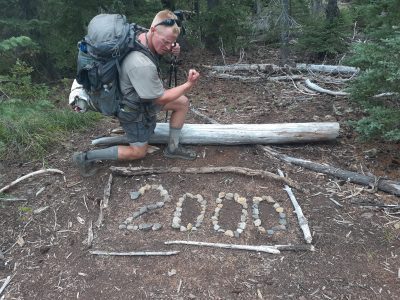
When Ihrig crossed into his home-state of Washington just four days later, he said he was speechless. “I was in tears that I made it home on foot…I can’t even describe how I felt, I was in tears of joy that I had made it that far.”
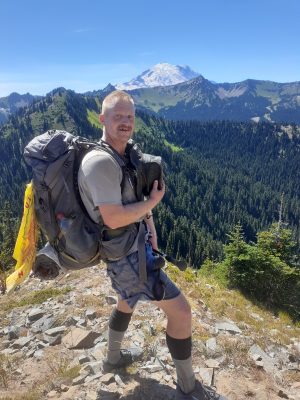
Along the way, Ihrig crossed paths with some familiar faces. In Washington, two fellow Salvation Army alum—lovingly labeled “Sally Boys”—greeted Ihrig as he passed through town to re-up his supplies.

In order to reach towns for food and supplies, hikers often have to venture off-trail. Sometimes the nearest town is 20-some miles away, which leads hikers to decide whether to attempt hitchhiking or lose a day by walking.
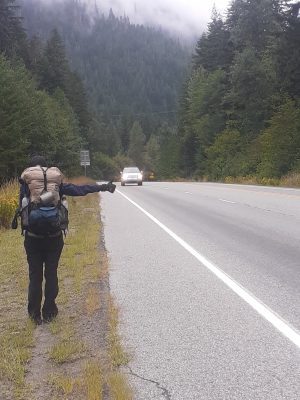
Ihrig said his most memorable experience with “trail angels,” or non-hikers who offer help and support off-trail to hikers, occurred while hitchhiking.
“I’m standing right on the side of the road and nobody even noticed me,” Ihrig said. “I’m kind of feeling a little a little depressed about it because I got to get to town. I have no food.” At that moment, Ihrig sought refuge in prayer.
“I said just a real simple prayer. I looked up and I said, ‘Hey God, can I get a ride?’ Just like that, It’s really easy,” Ihrig said. “And about three minutes later, this guy pulls it right next to me.”
Ihrig said the driver told him he didn’t normally pick up hitchhikers, but he felt “something” that told him to pick Ihrig up. Ihrig knows that “something” to be God’s work through his prayer.
“There were so many times I needed something…I needed help with something. Or I needed him to call my brain to help me think straight… that I prayed,” Ihrig said.
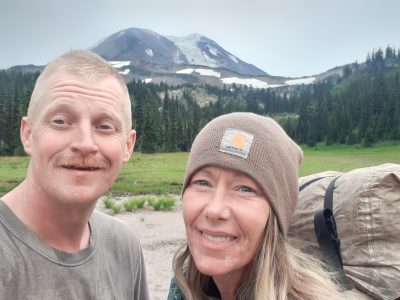
Ihrig said his time spent hiking in solitude left him feeling lonely, so he prayed for friends. Ihrig came across another hiker, Adrianne—known by her trail name, “Turkey B.”— in Northern California, but was surprised to see her again once he reached Washington. The two then decided to complete the rest of the PCT together.

“Closer to the end,” Ihrig said, “I was so strong—mentally and physically that I just…I was happy.”
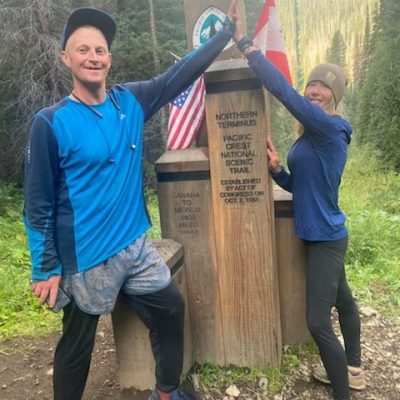
“There’s a sign that says ‘You’re in Canada’ That was pretty special for me,” Ihrig said, describing the feeling as “almost unbelievable.”
“I worked so hard to get to this point. I thought it would feel different. You know?” Ihrig said, “I didn’t feel like this was the end.”
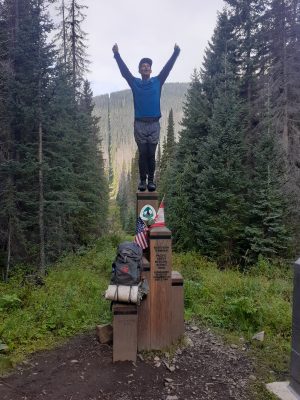
Three days after completing the PCT, Ihrig was greeted by the same men who dropped him off at the start of the trail near the Mexican border.
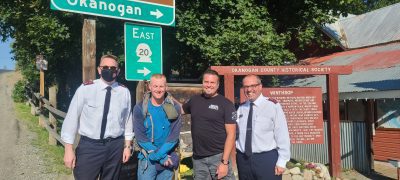
Captain Paul Swain was one of those men. As a Salvation Army officer, Swain was appointed to the ARP in Seattle, where he met Ihrig on his recovery journey.
Throughout the program, Swain said he mentored Ihrig and encouraged him to pursue his goal of hiking the PCT. “It’s goals like this that give you hope and, you know, push you through,” Swain said.
After not seeing Ihrig for over five months, Swain said when he saw Ihrig, he leaped out of the car when it stopped at an intersection. “I don’t know what came over me,” he said.
Besides being “super proud” of Ihrig, Swain also said he noticed “a different aura” and a “sense of peace” with Ihrig that wasn’t there previously.
Throughout the hike, Ihrig updated his Facebook with photos from the latest section of his adventure. In that way, Swain said, “It was like we were on the walk too sometimes.”
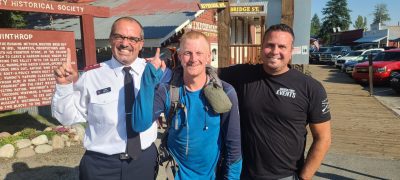
Since completing the trail, Ihrig said he has experienced “a bit” of post-expedition depression, a common reality among long-distance hikers. After the hike is over, Ihrig said, “you’re praying for a new purpose.”
The first day after his hike, Ihrig said he ran 5 miles. Soon after, Ihrig started a job at Grocery Outlet and said he runs to work every morning. “I basically just keep my body trained for the next adventure.”
Ihrig said he started the hike at 215 pounds and ended it around 185 pounds. “In my whole life, since I was a kid, I’ve never felt this good,” he said. “I feel better than I did when I was 25 years old.”
In addition to his work and exercise routine, Ihrig said he stays busy by volunteering at his local Salvation Army Center, where he gives free haircuts to those in need—a skill he learned while in prison, which he said makes him “very popular.”
Ihrig said hiking the PCT changed how he looked at obstacles in life, now understanding his own capacity to succeed at something once he sets his mind to it. Ihrig said if there’s something he wants to do, whatever that may be, it’s “really not that far out of reach.”
Two years ago, Ihrig made a vision board with what he wanted to accomplish, including hiking the PCT, and since then he said he has been able to complete each item.
Recently, Ihrig created a new vision board that includes becoming a best-selling author, making $100,000 a year, and planning for his next great hike: the Continental Divide. “I don’t know how to write a book. I’ve never been to school.” Ihrig said, mentioning how he earned his GED in prison. “But it’s not that far-fetched. I could, if that’s what I decided I want to do, I could probably make it happen.”
When asked if he would recommend the hike to others in recovery, Ihrig said: “I would say to anybody that wants to get sober and do something with their lives, do something that they’ve always dreamed about, I say, yeah, go for it. Do it!”
Do Good:
- See how The Salvation Army fights addiction.
- Hear this: Your story is uniquely yours. It’s the one thing you have that no one else does. And you’re the one who can tell it best. Take our free email course on how to find your voice, own your story and share it with others.
- Subscribe to the Do Gooders Podcast and tune in for good ideas. Get inspiration from the experts on how to do good and find meaning along the way—and join thousands in making an impact for good right where you are.








